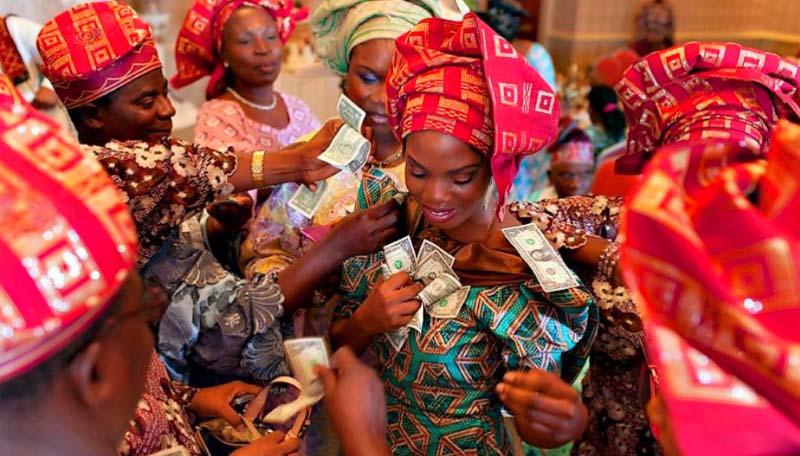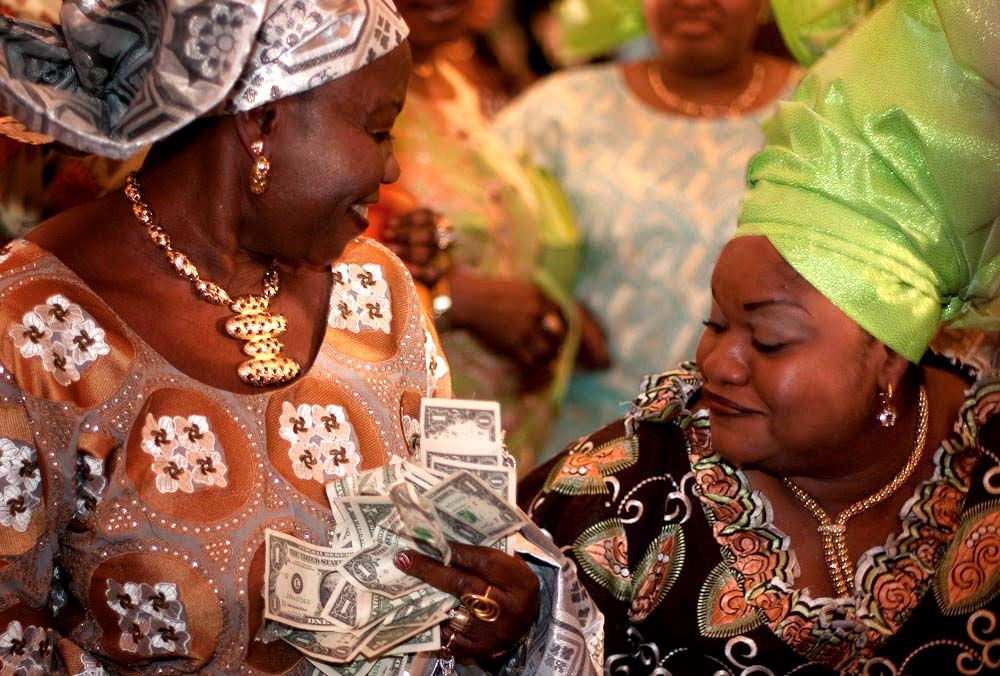It used to be festivals that took the center stage in the traditional African society. But celebrations have morphed into a whole new level. They no longer happen at specific times of the year; they now occur every Saturday. Today, no Nigerian weekend is complete without an Owambe party.
Owambe is a lavish and flamboyant party thrown by Nigerians which is usually characterized by a show of luxury, lavish spending, colour, extravaganza, paparazzi, lots of food, music, dance and networking. The origin is in Western Nigeria, particularly the Yoruba culture. Such parties are usually thrown during birthdays, house-warmings, naming, reunions, but most especially during weddings and sometimes, funerals.
Generally, the larger the Owambe party, the more successful its perceived.
Features of a Proper Ówàmbè
Aso Ebi: Pius Adesanmi describes Aso Ebi as Nigerian outfits made from matching fabric to be worn by a group of people to a party, wedding, or funeral as a uniform. Wearing a certain aso ebi identifies the group of wearers. For instance, at a wedding, all the bride’s friends might wear blue and gold, the bride’s family might wear white and gold, and the groom’s friends might wear black and pink, and so on. They could be Aso-Oke (traditional hand-woven material), cotton, damask, lace guinea brocade or even wax fabric (Ankara). Wearing aso ebi has its benefits; several times it dictates the kind of treatment the wearer gets at the party especially with regards to food and souvenirs.
Weekend: Unless in cases of emergencies, parties are usually held on weekends especially Saturdays.
Networking: Several Owambes serve as family unions. Guests may get to meet their distant relatives for the first time. Asides this, since they are usually attended by bachelors, spinsters, as well as the crème de la crème of the society, it becomes an avenue to make valuable life-defining connections.
Jollof Rice, Amala and other foods: Food at Owambes are usually overabundant. Some guests get to take home varieties of food in organised takeaway packs while some just take as much as they can in anything that can hold. While a large variety of food is usually served at Owambes, Jollof rice is the theme foreign food at Owambe. This legendary Jollof rice has given rise to the eternal battle of “which jollof is better” between Nigeria and Ghana. Amala is the prominent local food served. Amala is a solid paste made from yam flour.

Jollof & Amala. Common delicacies at an Owambe Party
Mogbo-Moya: It is not unnatural to go to a party one is not invited to. Mogbo-Moya literarily means I heard, so I came. Friends can follow themselves to parties while idle people can also wear nice clothes and attend a party near them. Sometimes mogba-moyas don’t even know what is being celebrated.
Music, Dance and Money-Spraying: There is usually a lot of loud music at owambes. This is usually complemented by a lot of dancing by the guests and hosts of the party. Money-spraying also belongs to this mix. It is not uncommon to find people spraying mint notes on the invited musician or on a fellow dancer at the party. Local musicians who sing local genres such as Fuji, juju etc. are prioritised at Owambes. Prominent amongst these are King Sunny Ade, Pasuma Wonder, Saheed Osupa, Wasiu Ayinde.

Dance and money-spraying at owambe
Souvenirs: These are more than items given as gifts by the hosts to the guests. This is a tangible evidence that a person attended a party. So it is normal to see people strive to have theirs. Souvenirs shared at parties range from handkerchiefs, buckets, hand fan, pens, to bowls.
Cost And Economic Effect
A standard Owambe party is valued at 2 million naira, taking into consideration the cost of event centres, food, clothing, ushers, music, amidst other things. However, the behaviour of Nigerians towards Owambe suggests that only the middle class are at this bar, the wealthier class spend much more.
Ojeniyi Ayokunu says the typical Owambe party is laced with magnificent display of wealth and opulence at least for the rich and its falsified version credited to the middle and lower classes. But one thing is bound to grace all Owambe parties: the crass show of money (borrowed or owned), class and the desire to make a statement. Many say it is a culture of waste, frivolity, hedonism and epicureanism. Others agree with Lord Frederick Lugard’s views in the “Dual Mandate in British Tropical Africa” that Nigerians are thriftless, lacking in self-control, discipline and foresight, full of personal vanity, fond of music and with little sense of veracity.
In June 2013, former President of Nigeria, Goodluck Jonathan redeployed Mr Abdulazeez Musa, the erstwhile Permanent Secretary in the Ministry of Petroleum Resources, over allegations that he threw a flamboyant wedding party for his daughter in Dubai. Late Umaru Musa Yar’adua expressed his disapproval at an FEC meeting in 2009 when he was informed that a minister in his cabinet had celebrated his 25th wedding anniversary with over 123million naira.
While it is in the spirit of Nigerians to throw lavish parties, the financial recklessness is worrying. There are cases where celebrants plunge into financial misery after pulling off an Owambe.
Lagos State Government once estimated that Lagosians spend 1 billion naira monthly on such parties. In a separate report, former Lagos State governor, Babatunde Raji Fashola subsequently added on 23 September, 2013 that an estimated 36 billion naira was spent on parties yearly.
The Ministry of Ówàmbè
A new industry has sprung up due to the cash flow in this sector. Event management firms, occasion fashion designers, ushering firms, security firms, event decoration firms as well as food catering businesses are major benefactors of such parties. Event centres which now serve as venues for partying charge as much as 2 million naira for a day rental. The cash flow can be hardly ignored.
The Ówàmbè Evil Spirit
It is reported that an increasing number of ladies remain unmarried because their eligible husbands are yet to muster enough funds to organize wedding ceremonies of their dreams. Wedding gowns now run over budgets previously thought unimaginable and yet remains to be worn just once in a lifetime.
There are also cases where parents forgo other important things such as the educational welfare of their children and instead break the bank to organize or be part of Owambes. Low income earners subscribe to thrift associations for the sole benefit of funding Owambe activities.
Many also feel it has descended into what Federick Nwabufo describes as a fast eroding culture of money management, prudency, modesty, chivalry, discipline and spiritual values in Nigeria.
The Prominent Gains
The atmosphere at an Owambe can hardly be ignored. The colour, the glamour, the merriment and the excitement are experiences most people will always look forward to. It is one of the few areas that strengthens the communal spirit of Nigerians. Owambe has risen to be one of the most unifying factors in the African society; putting people from different tribes under the same roof to share happiness, wear similar clothes and eat from the same pot.
Owambe is an indicator than Africans can overlook ethnic boundaries and stand in unity to celebrate success. 😉
[Header image]– Credits – opeyemioladotun.blogspot.com.ng

